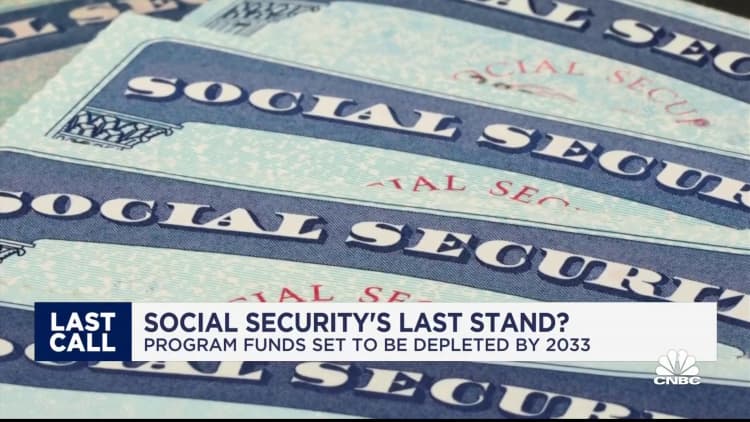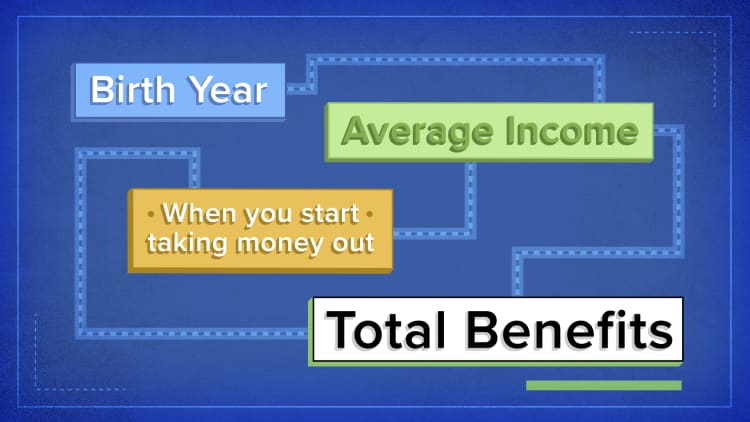Washington lawmakers avoided touching Social Security when they crafted the recent bipartisan compromise to raise the debt ceiling.
But the program may come under scrutiny as Congress continues to reevaluate federal spending.
"This is the first step," House Speaker Kevin McCarthy, R-Calif., told Fox News shortly after the debt ceiling deal, indicating he planned to form a bipartisan commission.
"The majority driver of the budget is mandatory spending" that was off the table during the debt ceiling negotiations, McCarthy said, including Social Security, Medicare and interest on the debt.
More from Personal Finance:
Retirees' biggest fear is outliving their assets, research finds
Social Security may be key issue for GOP presidential rivals
This tool lets you play at fixing Social Security woes
The idea of forming a commission to look at Social Security is not new. In 1983, a commission led by Alan Greenspan, who would later serve as Federal Reserve chairman, issued a report that served as a basis for Social Security legislation.
Social Security reform has been on Congress' to-do list for years. But the latest estimates from the program's trustees show the situation has become more urgent.
The program's combined funds are due to run out in 2034 — one year sooner than previously projected — at which point 80% of benefits will be payable, the program's trustees announced in March. But the fund used to pay retirement benefits is due to run out even sooner in 2033, just a decade away, according to the trustees.
Other Republicans have also called for commissions.

In January, Reps. Tom Cole, R-Okla., and Jake LaTurner, R-Kan., reintroduced a bill titled the Bipartisan Social Security Commission Act that calls for the formation of a bipartisan commission that would provide recommendations for improving the program.
Cole has been a lead sponsor of the bill for six consecutive Congresses.
"It is time for Congress to address this issue in earnest, or these funds will dry up and leave millions of American seniors at risk," Cole said in a statement when he reintroduced the bill in January.
Democrats have proposed legislation to expand the program by making benefits more generous while raising taxes on higher earners. Republicans, on the other hand, mostly oppose tax increases.
Advocates for a bipartisan commission argue the approach may help smooth out the differences between the parties. But whether a bipartisan commission is the answer to Social Security's funding woes is the subject of fierce debate.
Social Security benefit cuts unpopular, poll shows
A new poll from Social Security Works and Data for Progress of 1,191 likely voters highlights one big concern about that approach — that it would require benefit cuts.
When the voters were asked whether they would support the creation of a commission that would be "tasked with cutting some forms of government spending, including Social Security and Medicare," 72% of respondents said they opposed the move. While 22% supported it, 7% said they didn't know. (The values do not add up to 100% due to rounding.)
The poll also asked respondents whether they would vote for their member of Congress in 2024 if they joined a commission that recommended cuts to Social Security and Medicare benefits. The results found 67% of those surveyed would be less likely to vote for their member, 15% would be more likely to support them and 18% said it would not impact their decision.
"Even just taking an initial step to think about possibly cutting Social Security is not something voters would want to see," said Danielle Deiseroth, executive director at Data for Progress.
The only reason to have a commission is to hide the cuts you want.Nancy Altmanpresident of Social Security Works
To be sure, it remains to be seen what recommendations would come out of any commissions yet to be formed.
But Nancy Altman, who was Greenspan's assistant when he led his commission, and who now serves as president of advocacy group Social Security Works, is opposed to that approach.
"The only reason to have a commission is to hide the cuts you want," Altman said.
It's "insider Washington understanding" that benefit cuts have to be on the table, she said.

At the time the 1983 changes were enacted, the program was projected to be solvent to 2057, she noted. But what the actuaries did not anticipate then is the wealth and income inequality that would follow in the late 1980s and '90s.
While the Greenspan Commission put forth changes to restore the program's solvency in 1983, similar changes, such as raising the retirement age, would be inappropriate today, Altman contends.
"Raising revenue from the very wealthy not only is good policy, but I think the American people recognize it's the right way to go," Altman said.
'It has to be done in a bipartisan way'
Any changes to Social Security will require bipartisan agreement.
"You don't want Social Security to become a partisan issue," said Bill Hoagland, senior vice president at the Bipartisan Policy Center.
"If it's going to survive into the next century, it has to be done in a bipartisan way," he said.
Raising the payroll taxes to apply to higher earnings — above the current $160,200 cap — is popular, Hoagland said.
But just that change alone likely will not work, especially as the Medicare trust fund solvency issues may also require tax increases.
"You can just simply increase payroll taxes, but politically that will not fly," Hoagland said.
Other changes could be gradually phased in to protect current and near retirees from dramatic changes, he said, while protecting low-income people who are dependent on Social Security.
Benefit cuts — such as reducing the amount wealthy beneficiaries receive — likely will be considered, he said.
It has to be transparent, it has to be out in the open.Bill Hoaglandsenior vice president at the Bipartisan Policy Center
While commissions, task forces and special committees have fallen out of favor in recent years, the process was "fairly successful" under Greenspan, he said.
A new commission could be structured in a way that allows for the consideration of amendments after a it comes up with a proposal.
"[With] something as critical. as important and affects as many millions of Americans as Social Security does, it has to be transparent, it has to be out in the open," Hoagland said.
With the depletion dates approaching and time needed to implement recommendations and phase them in, lawmakers should get started right away, Hoagland said.


